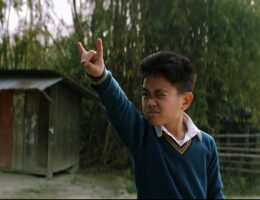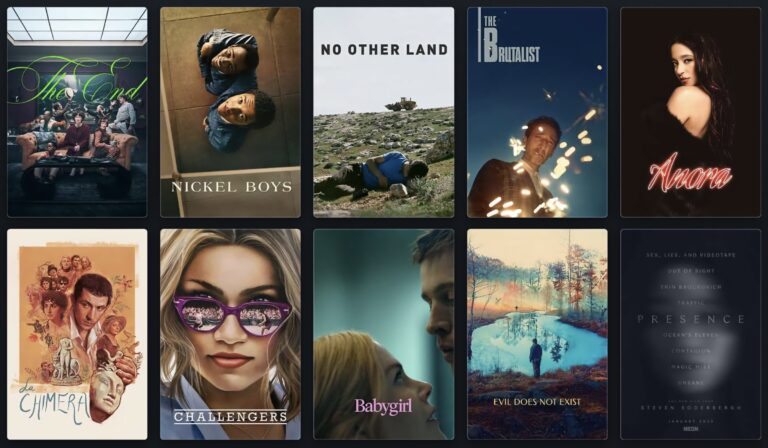There are no “bad” movie years, but some are better than others. I watched a lot of new films this year and 2024 had no shortage of good ones. However, whereas last year’s challenge was anguishing over which would end up on the outside of my favorites list looking in, this year’s struggle was deciding which to put into the final spots. Some of the difficulty may have been sorting out the difference between “favorite” and “best”, being pulled to the latter, and continually coming up with a list that was more challenging and emotionally ravaging that I might have liked it to be. But hey, isn’t that 2024 in a bitter nutshell?
Despite my apparent procrastination until the very last day of the year this list is very close to my nominations for SFCS’s annual awards that I submitted nearly a month ago with a few small tweaks based on arbitrary eligibility considerations. In the end, I flipped some coins and went with the ones that stuck with me, many months after first seeing them. I have them numbered but don’t take the order too seriously; as a cruel father of a doomed wrestling dynasty once said, “the rankings can always change.“
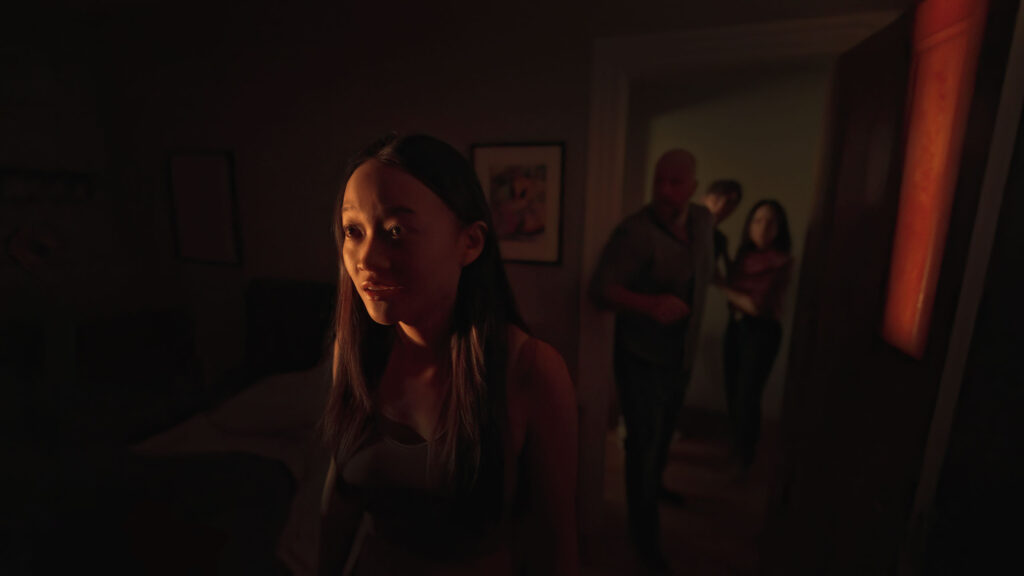
10. Presence (Steven Soderbergh)
Debated whether to include a movie that wasn’t even released this year, but it’s my list and I couldn’t not include this Steven Soderbergh ghost story that premiered nearly a year ago at Sundance. (It’s also one of two films on this list that uses first person filmmaking to great effect). In a series of long one-shot takes, we follow a ghost’s eye view of a family slowly coming undone. In the quiet gaze of this spectre, the family moves into a new place, makes the house a home, and the various plot threads simmer. The teenage kids can be brats to each other; the spouses have tensions rippling below the surface. They all occasionally boil over, like any typical family. Soderberg’s choice to confine us — like the unseen spirit — to a single setting of a realistically appointed house with ever gliding camerawork invites our curiosity until a startling series of jolts reveal with unsettling force and haunting power a recontextualization of what we’ve been watching. It’s both clever and emotionally haunting.
Presence will be released in theaters in January 2025.

9. Evil Does Not Exist (Ryusuke Hamaguchi)
An ecological parable plays out when residents of small mountain village near Tokyo learn that they’re on the verge of invasion by a “glamping resort” scheduled for development in the midst of their unspoiled forests. With Eiko Ishibashi’s original score as a beguiling soundtrack, Hamaguchi’s careful observation brings us inside both the pristine town’s quiet equilibrium as well as the team that’s been hired to transform it. As the film asks us to consider our duty to our community, environment, and family, the winds that whisper through the snowy woods enchant both the city-dwelling outsiders and the viewing audience alike while building to an arresting dreamlike finale.
Evil Does Not Exist is now available to stream VOD on multiple services.
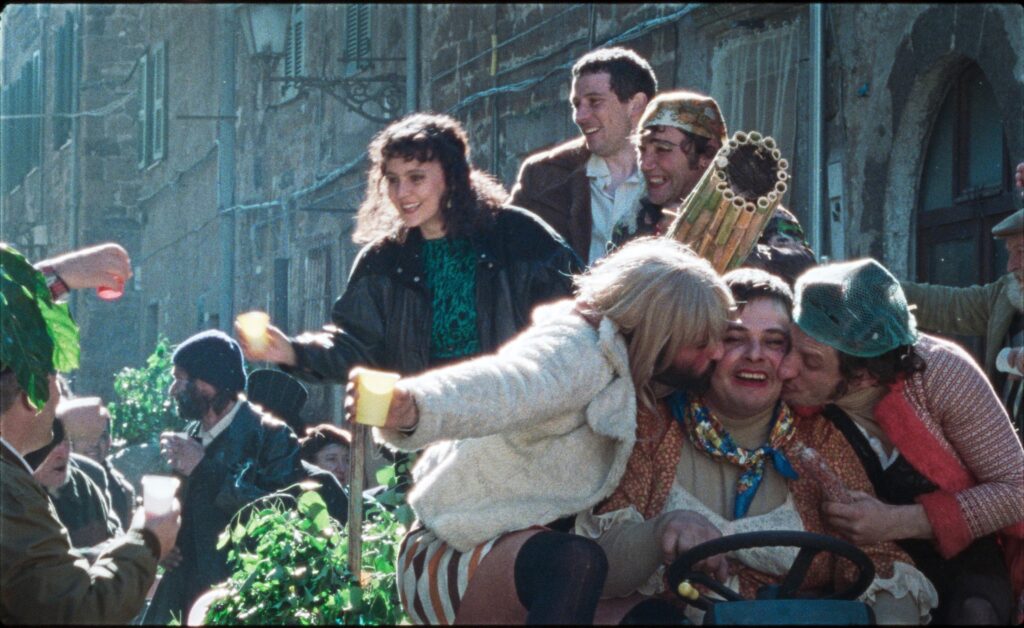
8. La Chimera (Alice Rohrwacher)
In Alice Rohrwacher’s dreamy contemporary fable, Josh O’Connor wanders the Italian countryside in a rumpled linen suit, using supernatural intuition and a dousing stick (ostensibly) to uncover high-value buried Etruscan artifacts to sell on the black market. What this scruffy scoundrel is really searching for is something far deeper, but his ramshackle quest brings him in contact with both some breathtaking art as well as the many ordinary people left on the periphery of a rapidly gentrifying society. Even as it switches gears to play with the conventions of a high end heist movie, it keeps its fanciful sights its characters and their social realities. Like the ancient treasures below the soil, this film and its near-perfect ending have remained firmly lodged in my memory.
La Chimera is currently available to stream on Hulu or rent on VOD platforms
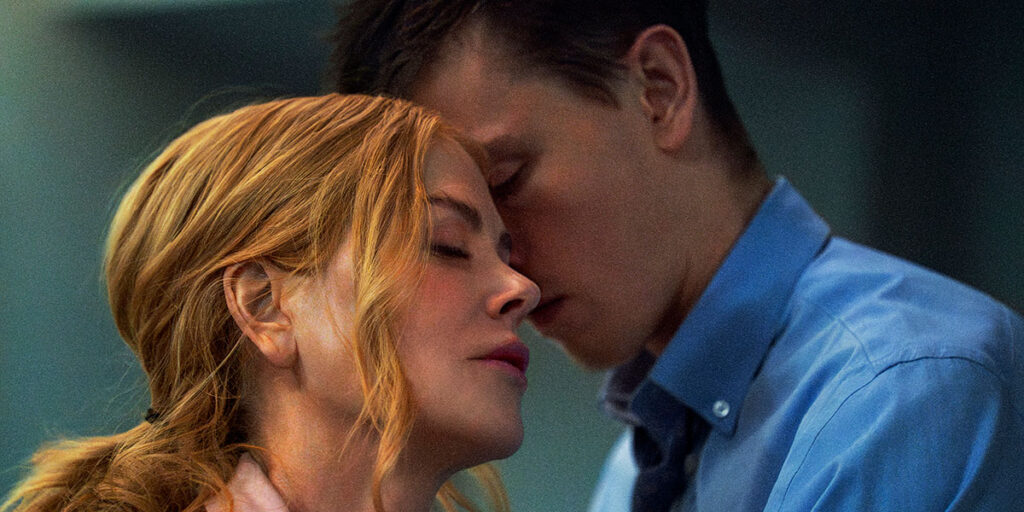
7. Babygirl (Halina Reijn)
Somehow “electric” has become among our most overused superlative in the current discourse, but there is no other word for the high voltage jolts of cat-and-mouse seduction that unfold in Halina Reijn’s long-overdue modern re-invention of the erotic thriller. Nicole Kidman is all kinds of terrific as a sexy tech company CEO and perfect mother who surrenders to her much-younger, magnetically handsome intern played with brash confidence by Harris Dickinson. Together, they’re a superconducting battery of suppressed desire for submission that finds release in the other’s frank unassuming facility for dominance. Wrapped in the modern permissive language of consent, it’s a morality gambit that’s peppered with the humor of a comedy of manners and needle drops that will make audiences levitate, the film delves into a house of mirrors that ends with an ultimate control freak letting go to get exactly what she wants for Christmas.
Babygirl is currently playing in theaters.
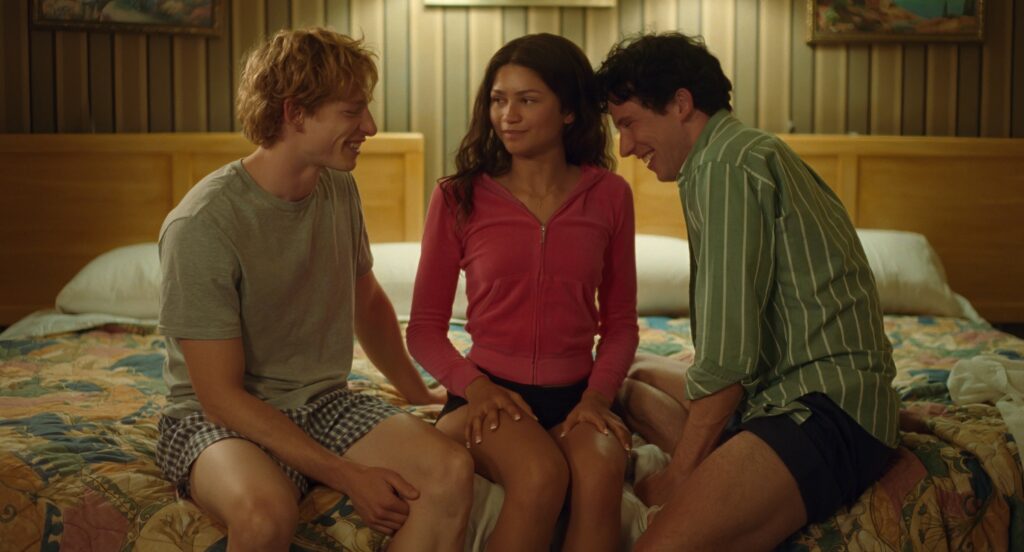
6. Challengers (Luca Guadagnino)
It was a breath of fresh air when the spring movie season kicked off with a relentlessly enjoyable film of sun, sweat, and a trio of young and ridiculously attractive actors occupying cinematic center court. Zendaya, Mike Faist, and Josh O’Connor’s scintillating chemistry scorches the screen for two sweaty hours of wonky serves, spinning slices, and volatile volleys on a sweltering tennis court while the timeline whiplashes across more than a decade of interpersonal lust, longing, and competition. Luca Guadagnino adds another to his canon of how our sexy human bodies drive us to madness, this time with a mind-blowing house-inspired soundtrack by Trent Reznor and Atticus Ross, gallons of perspiration, and creative camerawork that gave churros the viral moment they’ve long deserved.
Challengers is available to stream on Prime Video and to rent on various VOD platforms.
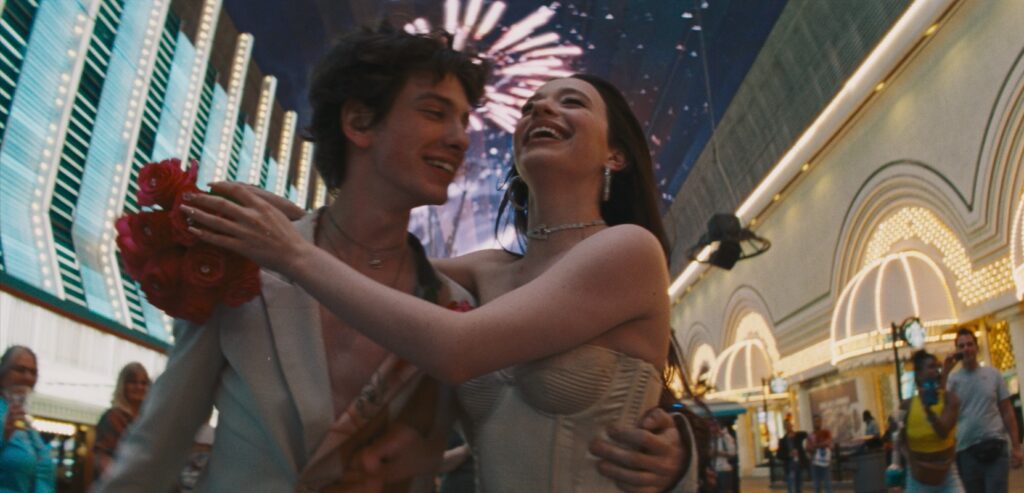
5. Anora (Sean Baker)
Sean Baker launches a rocket ship of delirious romance that can’t possibly last when a private dancer lands the ultimate girlfriend experience with a fun young Russian oligrarch’s heir. Mikey Madison brings tremendous depth and magnetic dexterity to the modern Cinderella story; Mark Eydelshteyn makes a phenomenal debut as the goofy rich kid who would rather stay in America playing video games, vaping, fucking, and partying on his parents’ vast fortune rather than being dragged back to Mother Russia to learn the ropes of his family’s shady business. The first act is a candy-colored dream until the cold light of reality dawns on the icy Sheepshead Bay mansion in the form of a clumsy trio of minders set on undoing an ill-advised marriage. Baker’s sideways swerve finds heartbreaking comedy in their manic high-stress quest through Brighton Beach to clean-up the idiocies of a runaway rich kid. They’re all a bit hapless, but his sympathies are clearly situated among the working stiffs left to tidy-up gargantuan messes for feckless oligarchs. Everyone in the cast is great, but Mikey Madison is a force of nature and among the best performances of the year. From her first dance to an unshakeable last scene, she gives us the whole world.
Anora is currently playing in theaters, including a presentation of its 35mm print at the Grand Illusion through January 2nd.
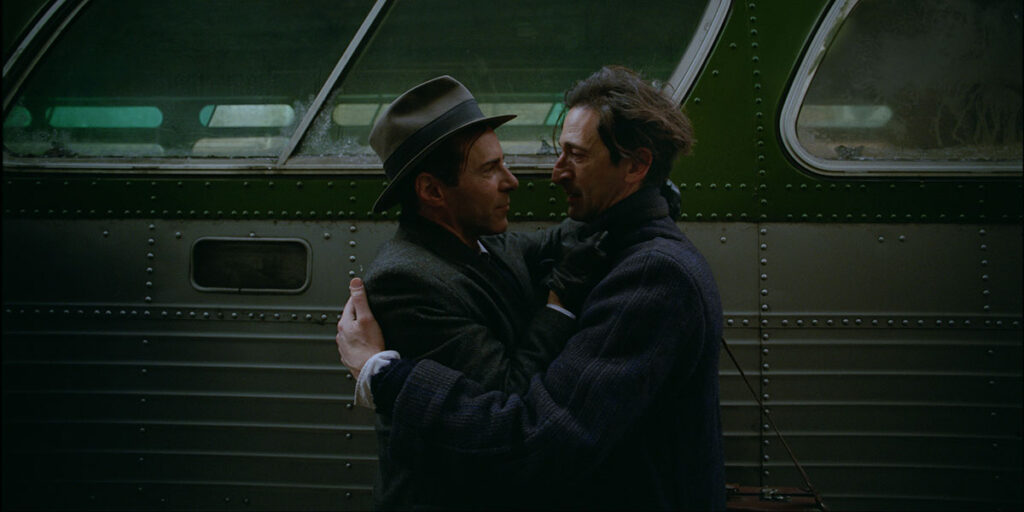
4. The Brutalist (Brady Corbet)
The year’s most openly ambitious movie — a three-plus hour (with an intermission) chronicle of an accomplished Hungarian Jewish architect’s post-war flight from a concentration camp to a major commission in Doylestown Pennsylvania — would be annoyingly pretentious if it wasn’t so damned good. From its shaky opening sequence under an inverted Statue of Liberty to its epilogue that traverses Venetian canals, Brady Corbet takes massive swings that make the most of every inch of its vast VistaVision frame. With apologies to Costner and Coppola’s excesses, the moviegoing year had felt decidedly small scale until the 70mm prints of The Brutalist traversed the fall festival circuit as one of the year’s hottest tickets.
In the title role, Adrien Brody’s singular performance is itself a towering monument of persistent determination, fierce pride, and unflinching dedication to practicing his craft, reuniting his war-torn family, and rebuilding himself in the face of xenophobia, discrimination, and heroin addiction. We meet him at his lowest point, broken (literally) and humble, and watch as he gradually rebuilds himself in fits and starts. We know he’s legit when a forced perspective shot of some custom bookcases brings a tear to our eyes. As a counterpoint Guy Pearce sizzles as a steely-minded industrialist who doesn’t immediately recognize the architect’s genius. But he eventually he throws his war profits around for intellectual companionship, artistic clout, and to impress his mother from beyond the grave. Theirs is an asymmetric, ever-shifting, situational alliance that flatters each man’s substantial hubris and insatiable ambition. With its tighter pacing and more conventional narrative of setbacks and ascent Part One is the more crowd-pleasing, but the muddy practicalities as Part Two spirals out of control are equally essential to this soaring American story told in concrete and steel. Corbet presents a clear-eyed vision of immigration as flight from extinction, genius as supplicant to fickle self-gratifying capitalism, and the painful discovery of the rot at the heart of this country. (What the film has to say about the parallel rise of Zionism and the establishment of the state of Israel that plays out in the background remains a matter for debate.) Visually breathtaking, stunningly provocative, and ever-surprising, it earns every minute of its epic runtime.
The Brutalist opens in Seattle in January 2025.
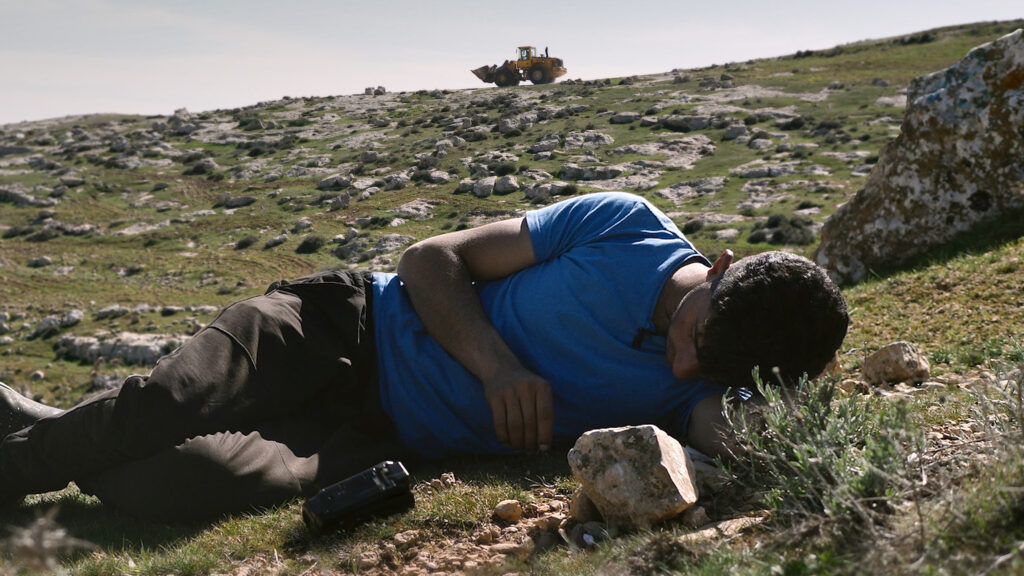
3. No Other Land (Basel Adra, Hamdan Ballal, Yuval Abraham, Rachel Szor)
For his entire life, second-generation Palestinian activist Basel Adra has lived under threat of the permanent erasure of his small West Bank village and others in the Masafer Yatta region by the Israeli military. With decades of archival footage of his father’s efforts in the resistance at their disposal, a coalition of Palestinian and Israeli journalists and activists began filming these destructive incursions when a court case halting them was resolved after decades of procedure-related delay. Over a four year period from 2019 to 2023 (with filmmaking wrapping just days before the outbreak of the still-ongoing war in Gaza) the film documents in close, ground-level perspective the senseless destruction of homes and schools, the constant displacement of families, and the enduring determination of residents to preserve their territorial rights by going so far as retreating to living in well-appointed caves.
Urgent handheld camerawork follows Basel’s tireless efforts to vigilantly rush to document the military’s persistent intrusions and harassment, often at great risk to himself. The film shows their protests as heavy construction equipment persistently reduces communities to rubble, one day, makeshift school, or household at a time. But most piercingly, it captures the heartrending moments of friendship between Basel and Yuval Abraham, a similarly young Israeli journalist. They have shared goals and ideologies, but far different rights and privileges in a segregated society. In rare quiet moments, late into chilly nights, over dinners, or on long car rides on the segregated highways connecting Hebron and the West Bank, their candid talks reveal varying degrees of skepticism and optimism about their personal and political futures. Their conversations are so poignant and the outlook so dire that I could barely make it through writing this blurb without bursting into tears. Over 95 tightly constructed minutes, this shatteringly essential film will make you so angry you’ll want to throw rocks.
No Other Land is still seeking distribution.
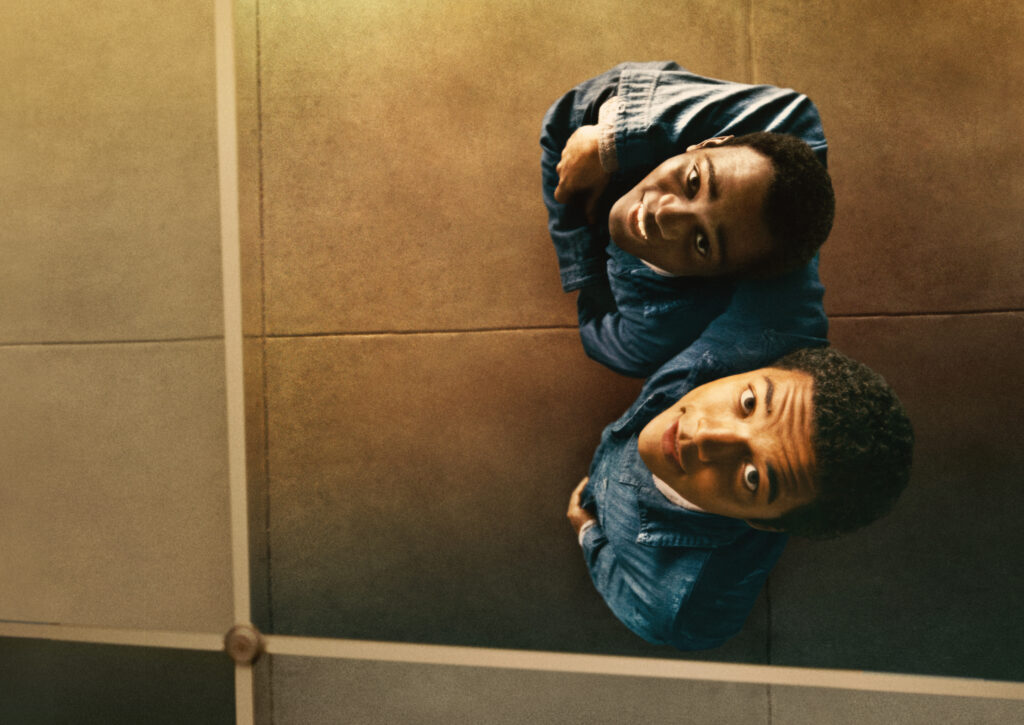
2. Nickel Boys (RaMell Ross)
RaMell Ross’s exquisitely-shot close first-person perspective makes for an audacious act of interpretation of Colson Whitehead’s Pulitzer Prize winning novel about an idealistic student unjustly incarcerated in a racist reform school through a cruel twist of fate. The movie opens by flooding the screen with Jomo Fray’s gorgeous impressionistic cinematography, seemingly shot directly through the eyes of Elwood, a young boy growing up in the Jim Crow Tallahassee of the early 1960s. We only catch stray glimpses of his face in reflections, but we’re immersed in his whole world as it changes around him. The choice begins to induce a kind of anxiety as we wonder when the storytelling will finally settle into something more conventional. To Ross’s credit, it never lets up.
On first watch, it’s bold yet disorienting choice. Repeat viewing cements the decision to stay within the character’s viewpoint as essential to the film’s success. The biggest payoff comes when withdrawn Elwood befriends another savvier veteran of student at the school and we begin to get more and more glimpses through someone else’s eyes. The effect is one of experiencing firsthand a life-changing friendship forged amid intolerable cruelty. Like Whitehead’s novel, the story bounces through time, with glimpses of a present day in which the school’s heinous abuses (based on the investigations of the real-life Dozier School) are unearthed. The book famously conceals a twist, but Ross’s use of constrained perspective does so much more than preserve it. The character viewpoint shots occasionally give way to archival footage or hint at unreliable narration. Together, the film’s stridently reconsiders ownership of Southern Black representation and challenges traditional notions of objectivity in favor of the subjective truth of lived experience. It’s unlike anything else, elevating an adaption of a powerful novel to something even more provocative, singular, emotionally resonant, and stunningly original.
Nickel Boys is currently in limited release; it arrives in Seattle theaters in January.
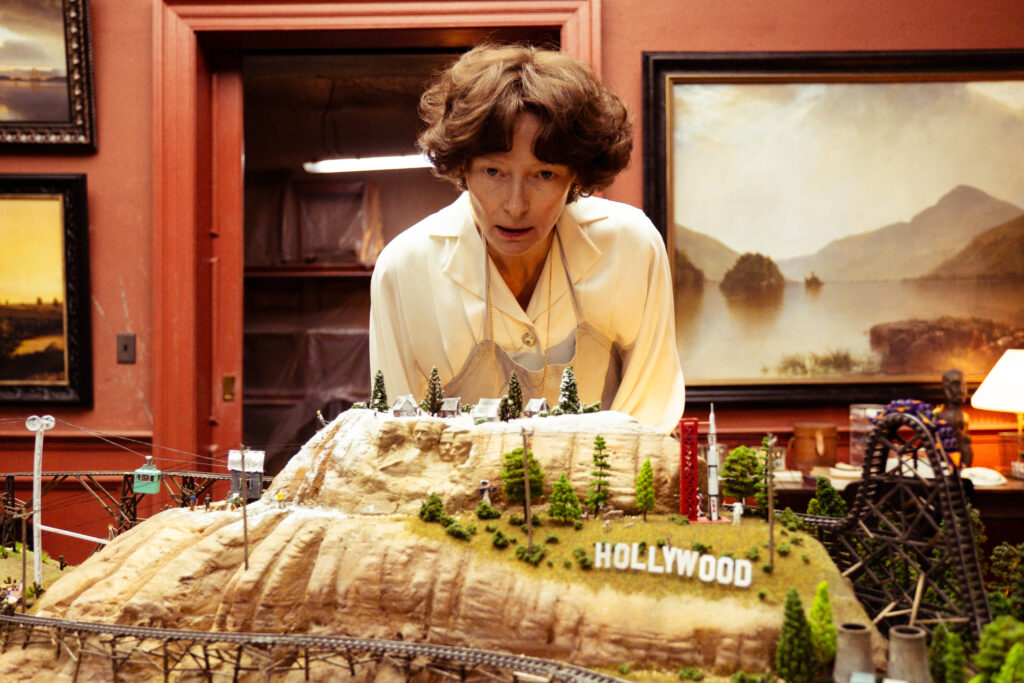
1. The End (Joshua Oppenheimer)
Quite a few high profile musicals this year but the one at the top of my list isn’t the oddly controversial (it’s way less sincere than its critics think while also being far less profound than it gives itself credit for) Netflix one or the mega-blockbuster Broadway adaptation that runs three hours without even getting to Act Two and is definitely the one with the sad singing clown. Instead, it’s the painfully prescient gutpunch about a wealthy family living in an opulent series of bunkers carved from salt caves deep below a smoldering long-dead earth who have spent decades waiting out a catastrophe of their own making while facing each new day with the same old upbeat songs.
Michael Shannon plays the cozily-comfortable titan whose industry that accelerated the apocalypse; Tilda Swinton a mother so enmeshed in her own personal retcons that even she’s lost track of the truth; and a fearless and heartbreaking George MacKay as their coddled son raised entirely underground with a skewed sense of history. Yes, it’s a two-and-a-half hour long sung-through musical about the complicity in the end of all life on earth, the songs aren’t particularly catchy, or even that well sung, so it’s unsurprising that the responses to it — especially from elite festival audiences (guilty as charged) — have been so decidedly, well … mixed. I was also a bit more flummoxed than invigorated by its Telluride premiere, but as the months stretched on I became more and more convinced that it was the year’s major achievement.
In a way, this is familiar territory for documentarian Joshua Oppenheimer, whose previous work found real-life tyrants confronting the atrocities they committed through re-enactments. Here, he makes radical use of the Golden Age song-and-dance format to expose the deeply human necessity for self-delusion and what happens when those foundations threaten to crumble to ash. If we refuse to see our own instincts for perpetually propping up our own hopes reflected in theirs, it’s only because the gnawing realization of impending doom is too painful to acknowledge. For me, it’s the most unshakeable movie of the year, even though, like the privileged-yet-doomed family and their unexpected additions at its heart, I’m still not at all sure what to do with any of nagging truths at its core.
The End is currently playing in limited theatrical release.
Other Special Mentions and Ramblings on the Year:
If I had limited myself to films I saw for the first time in 2024, powerful prison drama Sing Sing (and Golden Space Needle winner) would’ve probably made the cut. The same for Jesse Eisenberg and Kieran Culkin’s mismatched cousins road trip movie A Real Pain, which brought a light but poignant touch to adult men gingerly becoming willing to have great roof talks about their feelings while confronting dark family history. It’s mind-boggling to think of their neatly-organized tour of Poland’s holocaust history existing at the same time as Green Border, Agnieszka Holland’s ravaging but beautifully-filmed multifaceted portrait of all the horrific ways the state seeks to dehumanize and militarize the migrant crisis (and how the resistance valiantly strives to preserve humanity in whatever small ways they can). You should definitely steel yourself to watch it, but be warned that if you’re anything like me, you’ll find yourself like Tom Hanks at the end of Captain Phillips well before the credits roll. If we’re being honest though, the most I cried in public was during a glorious IMAX screening of The Wild Robot, a visually stunning dazzlingly animated feature whose unlikely interspecies friendships and hard-won lessons about learning to love seemed perfectly calibrated to tug directly on my frozen heart’s strings. A sarcastic self-guarded sarcastic fox played by Pedro Pascal? A thousand adorable precision missile aimed right at me; I didn’t stand a chance.
I am only a dilettante tourist in scary cinema, but it was quite a year for the horrors of having a human body. A few favorites go a smidge on-the-nose and off-the-rails by the end but these are not necessarily subtle times we find ourselves living in. First, The Substance, Coralie Fargeat’s arch satire of societal self-loathing was a whirlwind triumph for both Demi Moore and a massive loss for the shrimp industry. Jane Schoenbrun’s eerie, visually entrancing, cautionary love note to the nineties I Saw the TV Glow applied Lynchian threads to post-millennial trans awakenings is bound to be a cult-classic, a Donnie Darko for Zoomers but with so much more to say. Alien: Romulus was the most scared I’ve been in a theater. Immaculate was messier, but it’s perfect ending made Sydney Sweeney’s the far better of this year’s near-identically plotted “Novice nun has her womb hijacked by powerful men” films. Isabella Rossellini’s strident sister in Conclave — the most pulpy fun you’ll ever have trapped with a hundred power-hungry cardinals — would never.
On the action side, A Quiet Place: Day One was the most poignant meditation about the importance of finding a good slice of pizza in the face of impending certain death, and that’s even before the aliens show up. Gladiator II took a lot of well-deserved critical hits, but I for one can’t ever be too mad at Ridley Scott, one of our greatest living and most fun directors, whose run of high productivity has somehow, left him undercelebrated in an era of Marty and Clint worship. An all-time performance from Denzel Washington (accents be damned), live sharks in the Coliseum (historical accuracy be damned), and Fred Hechinger playing a syphilitic child emperor while dealing with a pesky live monkey? I was most certainly entertained.
In terms of stunt performances, nothing could hold a candle to June Squibb’s unlikely star turn as Thelma, a grandmother hellbent on serving vengeance to a telephone scammer. George Miller’s pyrotechnics in Furiosa: A Mad Max Saga came close, but Chris Hemsworth steals the spotlight from the title character. No wonder SFCS crowned him Villain of the Year; his Dementus and terrible trauma response has somewhere to go that’s not predestined by what we’ve already seen in a better film. Its scale is nearly matched by the relentlessly inventive snowbound slapstick Hundreds of Beavers that also finds a persistent hero (or hundreds of them, depending on your perspective) facing impossible odds in an unforgiving wilderness. Finally, while it’s mired in reference to hokey plot mechanics and could desperately benefit from even a tiny sense of humor, the year’s other Big Sand blockbuster Dune: Part Two concluded the first act of the Paul Atreides story with unmatched spectacle and a suitably grim ending.
Speaking of Timothée Chalamet, a couple words on the big holiday releases. Kudos to James Mangold for recognizing that the kid can sing and allowing A Complete Unknown for staying true to its title. The movie isn’t perfect, but to his credit he never lets Baby Dylan off the hook for being an enigmatic (if not massively talented) jerk who’s surrounded by more admirable characters — Ed Norton’s saintly Pete Seeger, Monica Barbaro’s exceptional Joan Baez, and Elle Fanning’s reluctantly bewitched Sylvie — who find themselves unable to be drawn into the myth he’s spinning on the spot. It was a rare bit of frankness is a sea of fawning over-reverent music docs and celebrity-driven biopics; if someone could re-cut the film without any reaction shots it might’ve been great.
On the topic of ancient annoying vampires, I’m largely in agreement with Tony, but can’t let the year come to a close without applauding Aaron Taylor Johnson, suffering through the world’s worst houseguest, as the only truly relatable character in Robert Eggers’s icy Nosferatu. The cinematography is exquisite and the physical performances were tremendous, but with a lot more of his energy and a whole lot less Vampire Contract Law the whole thing might have a better chance at making our blood run cold.
🎉📽️🎬 All of the Sunbreak’s 2024 Year-end lists: Josh | Chris | Morgen | Tony


